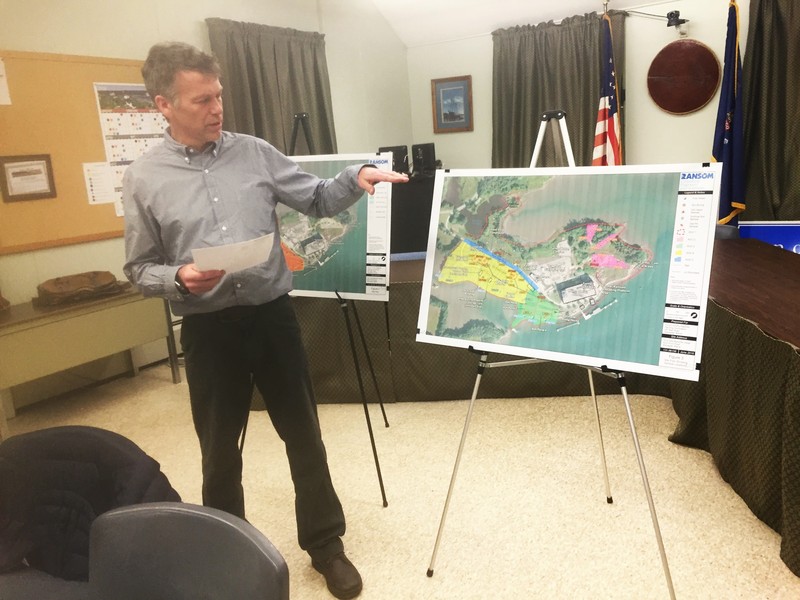Engineer: Cleanup would make ex-Mason Station lots fit for commercial use
If Wiscasset wins as much as $550,000 for cleanup, the 20-percent local match would be a cheap price to make some former Mason Station lots fit for use, an engineer said Dec. 14.
In-kind services might count toward the match, Ransom Consulting senior engineer Stephen Dyer said. “We would hope ... to minimize the dollar amount Wiscasset has to contribute. But in the grand scheme of things, having 80 cents on the dollar be free money on a cleanup like this is a pretty powerful thing ... For Wiscasset to be able to get out from under these obligations that cheaply I think is a very positive thing for the community.”
The Portland firm has been helping Wiscasset draft the applications to the Environmental Protection Agency for a trio of grants. Ahead of the Dec. 22 deadline, Dyer and Town Planner Ben Averill led a hearing at the municipal building.
The EPA announces its picks around April or May, and the money typically becomes available Oct. 1, Dyer said. “It’s a pretty long process. It’s a lot of hurry up, hurry up. Get an application in, then you sit and wait, and you hope Wiscasset gets funded ...”
If it doesn’t, the EPA allows for applicants try again, Dyer said. The grants are competitive — about half are approved, he said. Typically, if a set of applications is filed, as Wiscasset is doing, the EPA will either award all of them, or none, Dyer said.
Ransom investigated the site under a prior grant the Lincoln County Regional Planning Commission won from the EPA. The testing confirmed results of other tests about 15 years earlier, he said. The firm didn’t charge Wiscasset for helping on the grant applications, Dyer said. In response to a question, he said the firm would be a potential bidder on engineering work for the cleanup.
The town is asking the EPA for about $400,000 to clean up four ash ponds where Dyer said Mason Station pumped cooling water and other water for erosion control. There was no sign the ponds’ liners have leaked, he said. “There are still ponds full of sediment that we don’t want to have there, but they’re not (going) into the Sheepscot.”
Wiscasset also wants about $50,000 to abate asbestos in two pump houses and a maintenance building, and about $100,000 to clean up an area of contaminated sediment about 60 feet from shore, Dyer said.
The town has 11 tax-acquired acres, or about a third of the peninsula where the former plant sits, Dyer said. The town is currently foreclosing on more lots including the former plant, town officials have said.
Dyer said the proposed cleanup would leave those already town-owned acres fit for commercial use, a prospect Averill and LCRPC Development Director Mary Ellen Barnes each described as very exciting.
“Once we hopefully receive these grants and remediate these sites ... I think it’ll be great to have something on the peninsula that really highlights what a great site it is,” Averill said.
The county as well as the state view it as a key site, Barnes said, adding the EPA only gives out the grants to projects that will lead to a property being able to be developed. The LCRPC supports the applications, she said.
Describing the proposed cleanup, Dyer said it involves no-onsite treatment of the sludge or other materials being removed; everything would go to facilities licensed to take it. “It’s not rocket science ... It’s basically, get the bad stuff out of there ... and restore the property.” With the sludge and liners removed, the ponds would be back-filled, possibly with gravel as with a good material to build on, Dyer said.
The lots would be cleaned up to standards for commercial use, and grants could later be sought for other parcels on the peninsula, he said. Averill said the town has made no decision on use but that there would probably be a mix of commercial and industrial use.
In response to a question, Dyer said the cleanup would leave nothing in those areas to prevent the marijuana business Mason Station LLC pitched in a recent letter to the town.
Dyer noted the company did some of its own cleanup years ago. “When they actually did (cleanup) work, Mason Station LLC, they did it correctly, it’s just they didn’t always do everything ... They had a plan in place to close out the asbestos, they never did it. They had a plan to close out the ash ponds, they never did it.
“If they had the money and they did it, they did it right,” he continued. “It’s just they didn’t get to everything they ... hoped to get to. They ran out of money first.”
Reporters asked all the questions. Barnes and Wiscasset resident Susan Robson, chairman of the Wiscasset Waterfront Committee, were the rest of the turnout. Near the end of the hearing, Averill asked Robson for any comment.
“Glad it’s moving forward,” she said.
Event Date
Address
United States
























